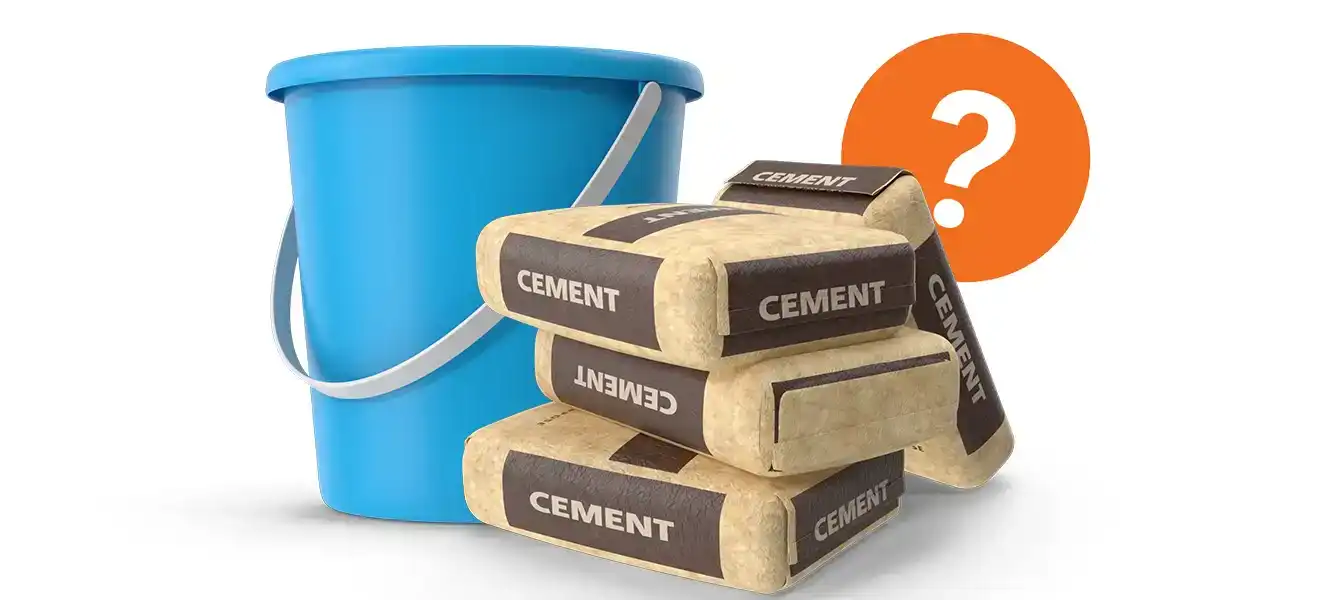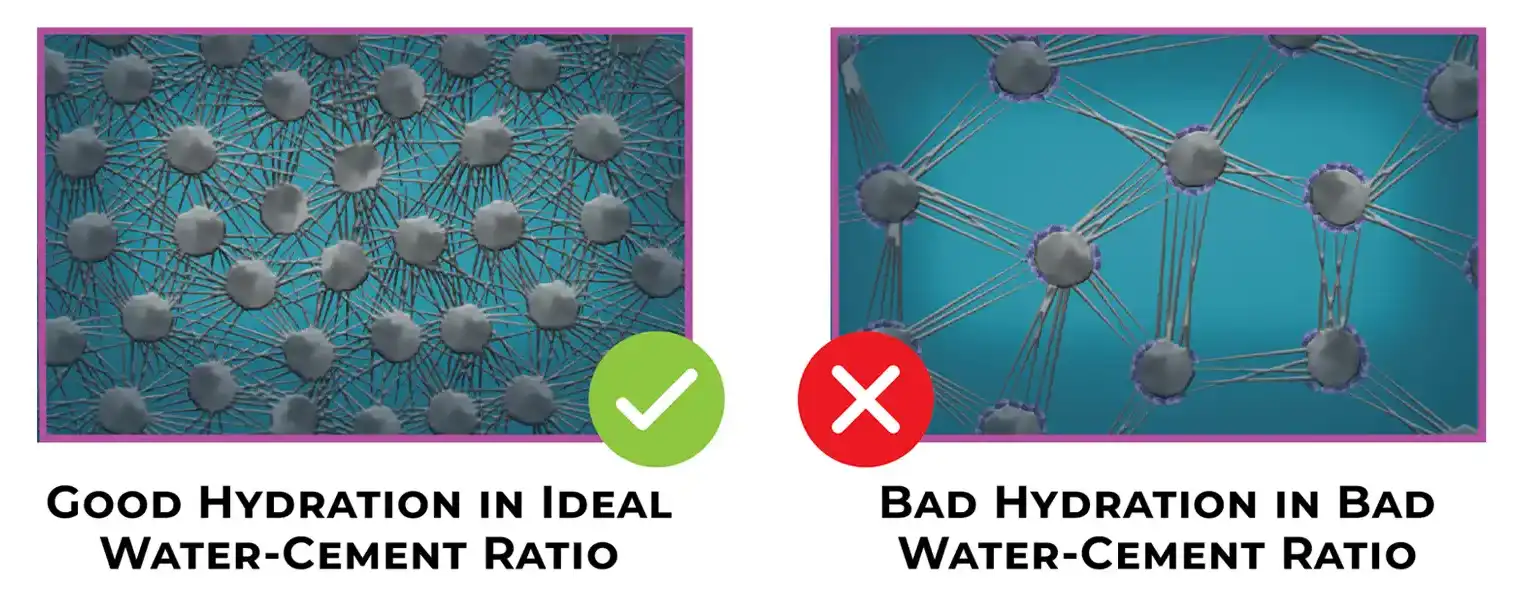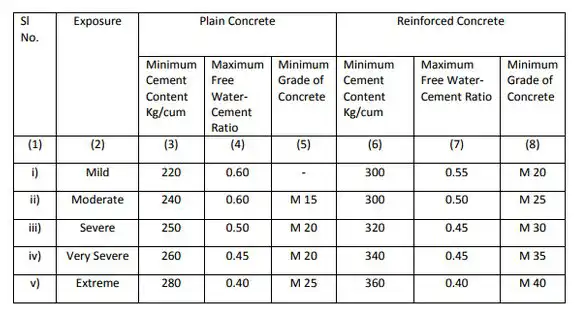
Concrete is a key ingredient in construction as it acts as an adhesive material, but do you know what makes good quality concrete? It is a simple mixture of water-mixed cement and other aggregates. The concrete’s quality and properties depend entirely on the materials’ quality and proportions. A key design is the water-cement ratio. It signifies the proportions of cement and water in a concrete mixture and is essential in establishing its overall durability, workability, and strength.
Read this article to learn more about the water-cement ratio and its importance.
What Is The Water-Cement Ratio?

The weight ratio of water to cement in a concrete mix is known as the water-cement ratio. It is also denoted as “W/C”. Along with elements like aggregate type, cement type, and desired concrete qualities, the W/C ratio is a crucial element when designing a concrete mix.
The water-cement ratio determines the overall properties of the concrete, and it becomes absolutely crucial for us to learn about its importance and how to get the ratio perfectly right. Let us get a deeper look into it.
How Do I Determine The Water-Cement Ratio?

If we were to calculate the perfect W/C ratio for our project needs. Mathematically, the water-cement ratio can be expressed as:
Water-Cement Ratio (W/C) = Weight of Water / Weight of Cement
What Makes W/C Ratio Important?
The water-cement ratio is a crucial factor in the concrete mix that determines the amount of water needed to produce a workable and durable mixture.

Workability: The application and usage of concrete in construction are largely facilitated by achieving the right w/c ratio. A proper W/C ratio guarantees that the mixture is just moist enough to prevent leakage of cement or excessive settling, and it also eases the flow of the mixture while reducing the builders' workload. Only with perfect consistency can it have its best durability.
Strength: The water-cement ratio significantly impacts the strength of concrete. If the water used is not in excess or less than required, the cement walls weaken or leave voids in the finished product.
Durability: The durability of concrete over the long term is influenced by ideal W/C ratios. A lower ratio produces concrete that is denser and less porous, which makes it resistant to chemicals, moisture intrusion, and other types of threats leading to degradation.
Shrinkage and cracking: Increased shrinkage can cause possible cracking, which can result from an unbalanced water-to-cement ratio. The cement’s water content can affect how much it shrinks, whereas a material with a low water content may not be properly hydrated and be more prone to breaking over time.
Permeability: An excessive amount of water in the mix can make concrete more permeable, enabling dangerous elements to seep within, causing internal damage and reducing durability.
What Happens When the Water in the Concrete Is Too Less Too Much?

When too much water is added to the concrete, thus altering the W/C ratio, it can reduce the strength of the mixture and cause cracks or shrinkage in a short period of time.
On the other hand, if too little water is added to the mixture, it increases the effort required to mix and use it during construction. The mixture becomes rigid and too hard to use. We need to strike the perfect balance in order to obtain the perfect bonding material.
The question arises: how do we achieve the perfect balance then?
Achieving an Ideal Water-Cement Ratio:

The intended strength of the concrete, environmental conditions, aggregate qualities, and the kind of cement used must all be carefully taken into account when determining the optimal water-cement ratio for a certain concrete mix. To reach the ideal ratio, concrete mix designers follow standards, guidelines, and best recommended practices. Keep in mind that to achieve the perfect balance, we must carefully carry on the changes made, as they determine the workability, strength, and durability of the structure.
The perfect mix would pass all the performance parameters and other standardized tests, and once you have reached that, you can be assured of the strength of the building.
Do you want to know where to purchase the best concrete sand that can match your construction needs?
CHOOSING ALPHA CONCRETE BLOCKS FOR CONSTRUCTION

Alpha Concrete Blocks is a 25-year-old Bangalore-based construction company that supplies your construction material needs with the best quality at nominal prices.
The practically preferred best water-cement ratio is from about 0.40 to over 0.60. The experts at Alpha Sand have designed Alpha C Sand such that the quality check of every batch of concrete produced, right from the first step, can strike the perfect ratio, and the lack of silt makes room for the cement particles and creates a denser Water-Cemet mixture. There is no compromise when it comes to the quality and durability of the products available in our company.
CONCLUSION -
By now, you have an understanding of the water-cement ratio and what makes it important in construction. Be sure to choose nothing but the best for your home, including the little unnoticed elements like the W-C ratio and other building materials. Happy construction!
FAQs-
-
What happens when the amount of water in the mixture is too much?
When too much water is added to the concrete, thus altering the W/C ratio, it can reduce the strength of the mixture and cause cracks or shrinkage in a short period of time.
-
What happens when the amount of water in the w/c ratio is too low?
If too little water is added to the mixture, it increases the effort required to mix and use it during construction. The mixture becomes rigid and too hard to use.
-
What is the water-cement ratio?
The water-to-cement ratio is the ratio of the mass of the cement to the mass of the water used in a mixture.
-
What is the cement ratio of 1?
The ideal water-cement ratio is 1 bag of cement: 22–23 liters of water
|
W/C Ratio
|
Result
|
|
0.38-0.4
|
It becomes too hard too soon
|
|
0.4-0.5
|
Ideal for ease of use
|
|
>0.5
|
Ideal for ease of use
|